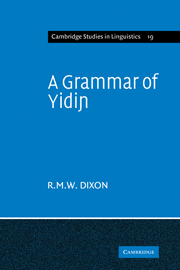Book contents
- Frontmatter
- Contents
- List of maps and plates
- Preface
- Acknowledgements
- Abbreviations
- Rough guide to pronunciation
- 1 THE LANGUAGE AND ITS SPEAKERS
- 2 PHONOLOGY
- 3 MORPHOLOGY
- 4 SYNTAX
- 5 DEEP SYNTAX
- 6 LEXICON
- APPENDIX: PREVIOUS WORK ON YIDIN
- TEXTS
- REFERENCES
- VOCABULARY
- LIST OF AFFIXES
- INDEX OF AUSTRALIAN LANGUAGES AND TRIBES
- Plate section
- Frontmatter
- Contents
- List of maps and plates
- Preface
- Acknowledgements
- Abbreviations
- Rough guide to pronunciation
- 1 THE LANGUAGE AND ITS SPEAKERS
- 2 PHONOLOGY
- 3 MORPHOLOGY
- 4 SYNTAX
- 5 DEEP SYNTAX
- 6 LEXICON
- APPENDIX: PREVIOUS WORK ON YIDIN
- TEXTS
- REFERENCES
- VOCABULARY
- LIST OF AFFIXES
- INDEX OF AUSTRALIAN LANGUAGES AND TRIBES
- Plate section
Summary
Simple sentences
Non-pronominal noun phrases. The words in a noun phrase in Yidiɲ agree, in all showing the same case inflection. It is this case ending that enables us to group the words together as members of one NP, and it is the choice of case inflection which indicates the function of the NP in the sentence.
Yet Yidiɲ does have a fairly definite preferred word order. Deviations from the norm occur, but they are not frequent. (Here Yidiɲ contrasts with its southern neighbour Dyirbal, which shows exceptionally wide word order possibilities – Dixon 1972: 59, 107–8, 291.) But since grammatical function is entirely determined by case inflections – the Yidiɲ preference for a fixed word order is best regarded as an aesthetic (or pedantic) fad, rather than a syntactic necessity – sentences showing unusual orders are generally quite grammatical, any oddity being at the level of ‘style’.
A noun phrase can involve the following constituents:
[i] a specific (i.e. non-generic) noun e.g. badil ‘rickety nut’, waŋal ‘boomerang’, dada ‘child’. This normally functions as the ‘head’ of the NP.
[ii] one or more generic nouns (the twenty or so generic terms, and the semantic hierarchy they define, are given in 6.2.1). A generic will normally precede a specific noun (deviations from this ordering are encountered extremely rarely).
- Type
- Chapter
- Information
- A Grammar of Yidin , pp. 247 - 383Publisher: Cambridge University PressPrint publication year: 1977



